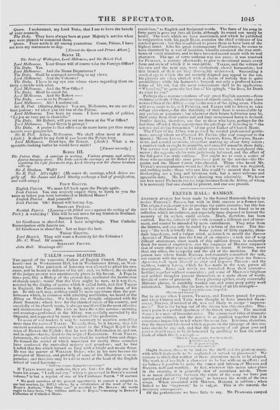TALUS versus BLOMFIELD.
'TEE appeal of the venerable Father of English Chtuich Music was heard—not in Westminster Hall, but in Westminster Abbey, on Wed- nesday last. The patriarch of' harmony was allowed to plead his own cause, and be heard in defence of his art : and, we believe, the decision of the judges present was unanimously given in his favour. A Pope in tunes past, like a Bishop of the present day, meditated the destruction of church music : would that the blow might be now, as it was then, arrested by the display of genius which it called forth, and that TALLIS in England, like PALESTRINA in Italy, might avert the doom of his art. Be this as it may, nothing could be more opportune than the per- formance which, in common with admiring an we heard at the Abbey on Wednesday. We believe the thought originated with Sir Joins EDGERS ; whose love for the classical mesie of his country, and especially of its church music, is always manifested in the most effective and disinterested way. Ills wish to have the roble service—morning and evening—performed at the Abliey, was cordially seconded by the Organist, and supported by many members of the profession. To some of Oar readers it may be necessary to mention something more than the mime of TAWS. To :melt, then, be it known, that this eminent musician commtnieed his career in the Chapel Royal in the reign of HENRY the Eighth ; that he saw the Reformation in, and out, and in again—havino lived to the reign of Eareantern. From Tames, fortunately, the cathedral seri ice received its musical form and shape. He framed the model of which musicians for nearly three centuries have confessed the unrivalled in and grandeur ; and he first kindled that lire which burned so lomug. with a bright and steady flame. He was the master of Vt'imaam By BD ; who in his turn became the preceptor of MORLEv, and probably of some of his illustrious contem- poraries; and therefore inay be said to stand at the head of the English .school of vocal harmony- .. Tail islits mop° Mous honor., sorox." If Taws wrote any anthems. they are lost ; for the only one that bears his name, " 1 call and cry ." which is preserved in Bovee's second volume,* is but a reprint of one of his Cantiones Sacra9, " 0 sacrum • We awe! ourselves of the present opportunity to correct ft misprint in our last number, (p. 102:10 where, by a substitution of the word if for in, BYRD'S Anthem, "Bow thine ear," is ascribed to Dr. IloycE : the words ought to base been, "the sublime authcm jaBeyce,"—meaning in Boace's Callection of Cathedral Music. convivium," to English and Scriptural words. The fame of his song in forty parts is gone out into all lands, although its sound can rarely be heard. The work which we have mentioned, and which he published in conjunction with his pupil HYun, contains the chief evidence of his musical powers; but this is sufficient to prove them to have been of the ' highest order. Like his great contemporary PAEESTRINA, he seems to have discerned by a sort of intuition, wherein consisted the true attri- butes of vocal grandeur, and to have invested sacred music with its real character. The age of verse anthems was not come : it was reserved for PURCELL, a century afterwards, to give to devotional music every form and style of which it is susceptible. TALLIS, and the writers of his own and the next age, were exclusively choral harmonists ; but this branch of their art they thoroughly understood. Succeeding a musical age in which the alt scarcely deigned any appeal to the ear, his phrases arc often clothed with a charm of melody that is quite astonishing ; while his harmonies bespeak not only a profound know- ledge of his art, but the most consummate skill in its application. " 'Wherefore," to game the last line of his epitaph, "he lives, let Death do si lint he can." Perhaps these commemorations of our great English masters—those welcome revivals If the glorious times of church music, which take place nowand then at the Abbey—may be the notes of the dying swan. Choirs will som cease to be, and Poncem. and TALLIS will be. driven to take refuge elsewhere,—for the durability of their fame is unassailable by any prelate or potentate : but wherever their future habitation may be, their exile from their native soil and long accustomed home is decreed. Double thanks, therefore, are dime to those who have, perhaps for the last time, afforded their countrymen the privilege of listening to " the solemn and divine harmonies' of our great Father of Church Music.
The Choir of the Abbey was assisted by several professional gentle- men ; among whom we observed Dr. Eaves-, (the real composer to the
Queen,) Messrs. Lucas, E. TAYLOR, FRANCIS, KING, HAWKINS, BRAD■ DrItY. and say end amateurs, altogether making up about forty voices ; a number such as oiAit to assemble, and once did assemble there daily.
The service was pertarraod with strict attention to its antiphonal cha- racter ; the 0;Tc-site chairs were judiciously balanced, and the effect of the full parts was truly sublime. Nor ought we to omit a notice of
those who sustained the most prominent part in the service—the Or-
ganist, and the Minor Canon who chanted. Those who heard Mr. Tunau's accompaniments would feel that it was all that was required, and nothing more: those who saw him would be assured that he was discharging not a long and laborious task, but a most welcome and agreeable duty. Mr. Ltneros's chanting was admirable. We know not how ninny Prebends recsive large incomes from the Abbey, of whoi. it is necessary that one should be present, and one was present.


























 Previous page
Previous page